#(aka post the events of da2)
Explore tagged Tumblr posts
Text
I feel normal about Anders. Don't ask about the four wip fics I have of him
#my posts#🧶#🧶 love someone like you#don't expect to see all of them tho#one i have finished already technically#but it's for later on in the relationship#(aka post the events of da2)#so bcs of that i'd rather save it for another like. milestone in their story fic#and also that fic is just really heavy considering it's about the aftermath of the chantry explosion and anders's view of himself#after getting unfused with justice#so it's one that like. i'm hesitant to post when it does come to a better time for it#bcs it is heavy and usually when i post more for lack of a better term adult fics#they just kinda fade into the background or lead to me getting mean anons from random people (not followers)
6 notes
·
View notes
Text
Western Approach: Old Chantry Trail Signs
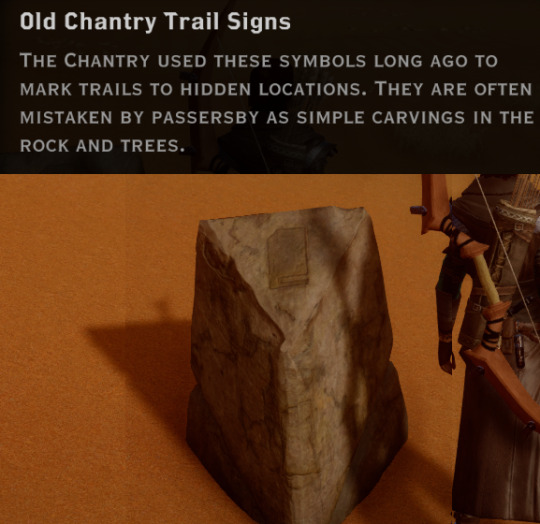
[This is part of the series “Playing DA like an archaeologist”]
There is a strange thing called Old Chantry Trail Sign, which was supposed to show hidden locations. In general they mark caves with interesting things inside. What surprises me is that… depending on the content of the cave, most of the time it doesn’t look related to a Chantry “pilgrimage” along this region. It looks like a co-opt element by the Chantry.
For starting, the symbol on the rock is strange. It looks like a book or a house depending on how you see it. The rock itself is also weird: it’s a triangle. The symbol on it has not suffered erosion, as the stone did.
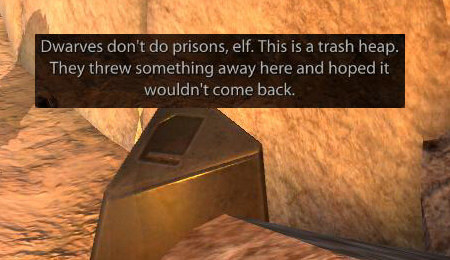
This small sigil has been seen before in DA2. In fact, these objects are all spread over Kirkwall and in Vimmark Mountains [where Corypheus’ prison was located], which function is to offer codices of each part of the city in the former, and to inform about a dangerous entity [Malvernis] in the latter.
In DA2, they were made of metal, so I suspect this object is a Tevinter/Dwarven element used to mark which parts of the city you were entering. In Western Approach seems to keep a similar function, they still mark locations, but maybe they were altered by the Chantry, or maybe they were not altered at all and people just misunderstood the whole nature of this object. I hesitate because we don’t know the source that claims that these things are a Chantry trail sign. It could have been a sign done by the Tevinters in this region, indicating where their fortress and prisons were [there are many in this region, and we need to think that this region looked more like Hinterlands before the Second Blight], and a random guy came here centuries later and misinterpret them, considering them as Chantry-made. What I’m saying is that we don’t truly know what they are, and they are claimed to be Chantry-made when the things they point out [with the exception of one] are not Chantry-like, but reinterpreted as such.
Let’s check some:


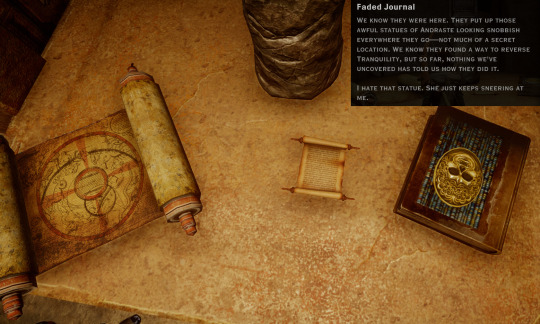
One of the caves gives us a note of a “Lost idol” and a Faded Journal. The note claims that this is a statue of Razikale being worshipped. [More details in the post of The Lost idol]
The Faded journal is very confusing, if you believe that the female figure in the lost idol is a snobbish Andraste. Sadly, this has no author or source, so we can’t trust it at all, neither feed theories about it just because a random person confused a female figure in a Tevinter design for Andraste. Since it also speaks of reversing tranquillity, I suppose it’s a very recent document, older as the events in Asunder in the worst case scenario. This could be the traces left by a character who in the book learnt about the cure of tranquillity. I found it hard to believe that these comments and journals are Pharamond’s, simply because he was a tranquil during his investigation in this zone, and all these codices are filled with emotions and strong opinions, so I don’t know if they tried to retcon what happened in Asunder or this was written by a Templar-bodyguard of Pharamond. I’m inclined to think the latter.

You can only see blocks of stone around the Lost Idol without patterns, unless you move a bit to the background. In there, you see the Dwarven pattern. This cave was done by Dwarves
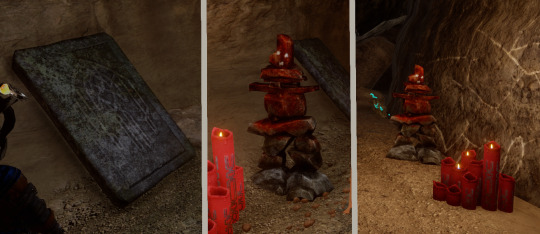
In another cave marked by these signs, we find a tunnel with two of these curious inuksuit bathed in blood and illuminated with candles that we see commonly used in Chantry-related places. There are some tablets/funerary lids that, with that design, have always been used on Elven tombs or related to elven crypts.
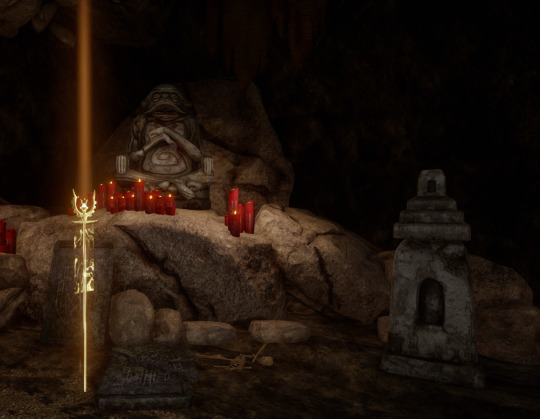


At the end of the tunnel we find the fucker, aka The Strange Idol, but now there is a note accompanying it, potentially explaining it: "The Thing in the Dark" . In the Shattered Library we read a codex which is the only thing that could potentially link this statue with anything lore-related: Elgar’nan. The Thing in the Dark has an ominous message:
This statue is oddly warm to the touch and shivers slightly, as though it might have a pulse.
This description repeats two elements that we have been seeing along the games, always related to Fade/Elven magic: warm to the touch and beating heart movement. Elements that share this, or part of this description can be listed here:
In DA2 [check DA2: The Strange Idol] we saw this statue two times and in both it was possessed or bind to a demon. Merril could feel something in the statue when the demon was bind to it. This could also be the case here.
In the Lost Temple of Dirthamen, we collect parts of the body of the High Priest. They are warm to the touch to what Cole says that these piece are alive, and Solas would explain that this effect is caused because the original creature connected to it is still alive [video]. I dont know if similar mechanism could apply to this statue.
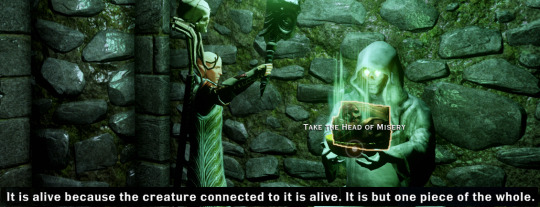
Red lyrium is warm [and angry].
Cole, in the Deep Roads of Trespasser will say tot he inquisitor "Your hand hurts. A heartbeat. Not yours. Hammering the beat of a song in its final verse. I'm sorry." The magic of the anchor has a heartbeat.
In Jaws of Hakkon DLC, Telana [Ameridan’s lover] had a bow with a description “This bow seems to have its own pulse and is oddly warm to the touch.”


Beside the idol there are elven tablets and objects related to elven funerary rites. Close to them we find a book with the codex of The First Blight: Chapter 2. Sadly, the text is written by Genitivi, and like all what he writes, it reeks to Chantry’s point of view. When it comes to ancient history, he is the least reliable source. In this codex we have the same old story of how the blight appeared: The chantry says that the old gods whispered to Tevinter magisters encouraging them to enter the Golden City. Once they did it, they corrupted it with their presence, so the Maker returned them to Thedas, and trapped the Old Gods underground. But with the ancient documents we find in severals pre-blight ruins, in addition to Corypheus' and Solas' words, we know by the end of the game that the Magisters have been unable to listen the Old Gods in their dreams for a long time. They despaired. So, the "true" story told by the Chantry has another order:
The “Maker” trapped the old gods for unknown reasons,
The gods went silent. All the worshippers began to despair with their god’s silence.
The Magisters entered the Golden City, looking for their gods that had gone silent,
The golden city was contaminated already, and the Blight infected them.
This happened underground, from which the first darkspwan came.
Anyways, in this cave we also can loot a chest and find Aegis of the Order, which is a bit confusing. I assume this element justifies the presence of the book speaking about the First Blight. A templar or similar was here. When you relate it to Pharamond’s research, I don’t know if we can consider these objects as elements left by his Templar bodyguards.


For the last place of the trail sign, we head to the South of the region, and we find some ruins that are impossible to identify [they have no patterns on them, they are just blocks of stone]. Beyond them, we find a cave with a magical barrier, and some symbols around that we finally can recognise as truly Chantry-related. This is the statue we saw in DA2 in the Chantry square, the one I suppose it’s Hessarian. There are banners of the Chantry as well.
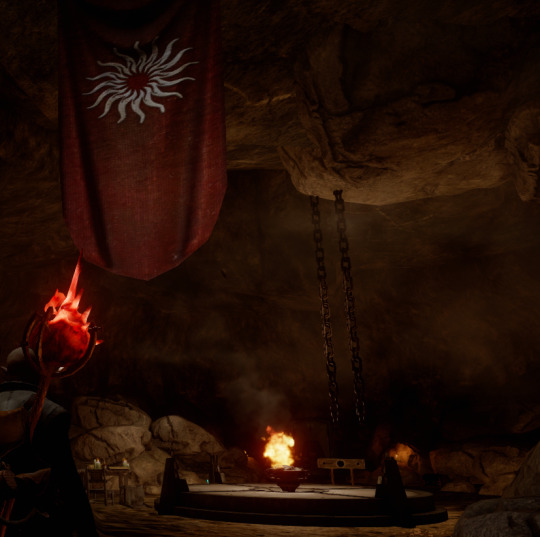
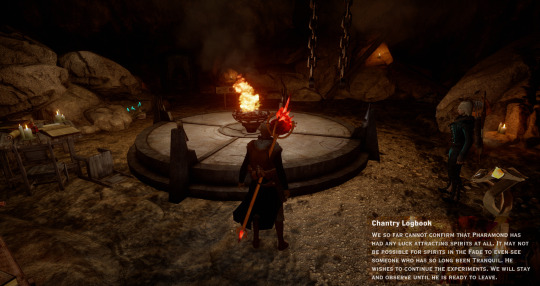
Inside the cave, we find a circle that we saw already in DA2: Legacy used where the guardians/pride demons were sealed in Corypheus’ prison. This one in DAI lacks of the typical torches with the sign “+” on them.
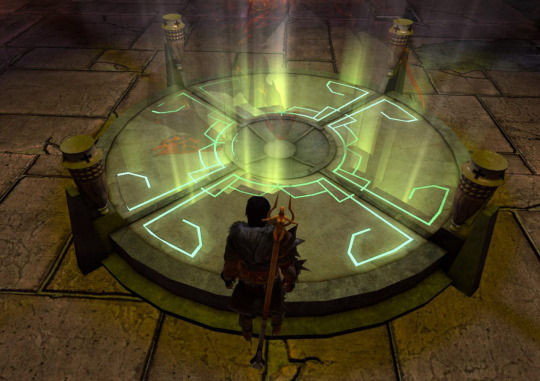
There are two chains hanging from the ceiling which suggests this was a place where someone was held suspended or at least, chained from their wrists, magically sealed in the circle. Here, we find Chantry Loogbook, where those who read Asunder can identify a name immediately: Pharamond, the tranquil that was healed. This codex gives the idea that Pharamond was accompanied by a group [of templars I assume] who helped him in his experiments until he reached Adamant Fort. That would explain the emotional rejection to the “sneering Andraste”, the lecture of the blight with templar objects to loot, and this note. However, I feel there is some retcon here in comparison with the book: Pharamond performed his experiment of being possessed by a demon to cure his tranquillity using a circle inside Adamant fortress. But well, it was easier to leave the fortress for the main quest, I suppose.
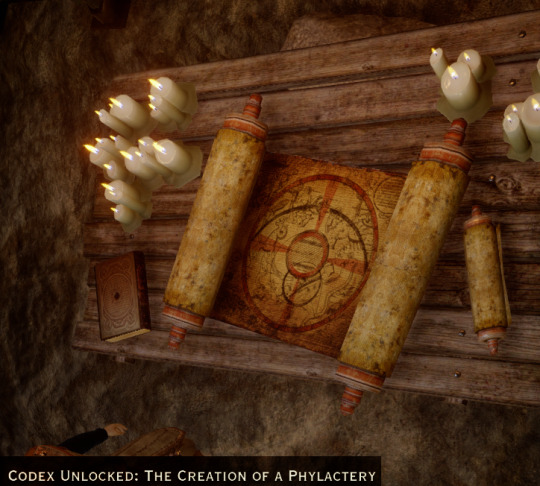
On the table, we find the codex about the creation of phylacteries, which makes the player question how much the Chantry can claim to be against blood magic when they use it for the most basic of the rituals that a mage passes through. And if they do this, then maybe, there are more things that they forbid but practice under some excuse.
[Index page of Dragon Age Lore ]
#Western Approach#Elvhen funerary lid#Strange Idol#red inuksuk#Razikale Ceremony#Playing DA like an archaeologist#warmth and pulse
6 notes
·
View notes
Link
by Anonymous
A little tale that takes place post Trespasser. What happens to our dear Commander Cullen? Where has our quirky Warden Alistair gone? Will these two ever get their happily ever after?
Why yes, yes I think they will...
Words: 13662, Chapters: 3/3, Language: English
Fandoms: Dragon Age (Video Games), Dragon Age - All Media Types
Rating: Explicit
Warnings: No Archive Warnings Apply
Categories: M/M
Characters: Alistair (Dragon Age), Cullen Rutherford, Rylen (Dragon Age), Leliana (Dragon Age), Female Warden (Dragon Age), Nathaniel Howe (mentioned), Bethany Hawke (mentioned), Garrett Hawke (mentioned), Various Companions from DAO (mentioned)
Relationships: Alistair/Cullen Rutherford
Additional Tags: Post-Dragon Age: Inquisition - Trespasser DLC, Endgame life, reference to DAO-DA2-DAI canon events, Tooth-Rotting Fluff, Fluff and Smut, Humor of the type only Alistair can provide, Gratuitous use of bath time, Heartfelt reunion, Happily Ever After, I fixed all the things
9 notes
·
View notes
Note
Oh I absolutely think cullen and a mage inquisitor would have clashes. But people still seem to think that redemption = as much punishment as possible to make up for whatever they did when a good redemption arc is ACTUALLY making up for what they did, recognising their mistakes and trying to be a good person which is exactly what cullen was doing in DAI. He was questioning by the end of DA2 even. He also isn’t the only person responsible for what happened to the mages either (eg. the seekers who never even bothered to check in on the gallows in ten years of Meredith’s command but Cassandra rarely gets any flak).
If this is the same anon from the last question and you *really* wanna have a convo about Cullen and the way I've written him then you're gonna need to check your tone and come out from behind that grey face. Your initial message was rude af and it's wild to me that you read my response and still have the gall to continue messaging me with this shit.
If you're not the same anon, then hi, feel free to read on.
Regardless, you can find my thoughts on Cullen's "redemption" in DAI here, in a post I wrote years ago.
I'm not interested in discussing Cassandra or the fandom's reaction to her misdeeds vs Cullen's bc my fic isn't about Cassandra. I'm not sure who or what you mean when you say "people seem to think (x) about redemption arcs" but I've made my feelings on his redemption and my goals in portraying it in my writing on multiple occasions. Which you'd know. If you bothered to read it. 🙃
Even if Cullen were One of the Good Ones (aka didn't believe mages were subhuman), he still would've actively contributed to the harm of a huge group of people just by being in the Order. Their sole directive is to keep mages imprisoned at any cost, up to and including execution. They literally hunt mages for a living and use their belief in the Maker to justify it. Even if he'd never threatened, harmed or killed a single mage (which I find unbelievable) he still dragged apprentices from their bed and forced them to go through one of the most traumatic events of their life, he still separated parents from their children, he still forcibly dragged innocent people back to a literal prison. And if somehow he didn't do any of that, even if his only job was to sit in the Circle and block the doorway all fuckin day, he still supported and upheld a system that actively oppresses a huge group of people who's only sin was being born with a stronger connection to the Fade.
In DAI Cullen says Meredith was "harsh," but her measures were necessary for safety. Sure, he doesn't view mages as subhuman anymore, but he still expresses anti-mage sentiments, believes the carceral system is justified, and supports Meredith's extreme restrictions. He wasn't doubting the ethics of Meredith or the Order's actions in DA2, he was doubting Meredith's sanity.
As far as him trying to be better in DAI...where? At no point does Cullen support or assist the mages of his own accord. He opposes recruiting the mages but goes along with the inquisitor's choice because...well, they're the fuckin inquisitor lmao. He doesn't pay reparations to those he's harmed, is never confronted by a survivor of the Annulment, any families of those killed, etc.
You're right, Actually Good Redemption arcs involve actionable steps taken to make amends, and those steps are not part of Cullen's arc in DAI.
But the crux of the issue here is that you have no idea how I'm treating Cullen in this fic or what my intentions with his character are because you haven't fucking read it. A huge part of the reason I've included him in it at all is because I liked romancing him in DAI and thought his redemption was half-assed and lacked believability.
If you read my work you'd know my Inquisitor receives a letter from the surviving mages of the Kirkwall Annulment demanding his resignation.
If you read my work you'd know Cullen resigns of his own accord after reading letters from the survivors and hearing their stories firsthand.
If you read my work you'd know my Inquisitor gives him two choices - stay, quit lyrium and be reassigned, or go your own way. He chooses to stay and voluntarily imprisons himself.
If you read my work you'd know the survivors pushed for a trial and execution, and my Inquisitor chooses to spare his life.
Accountability, redemption, making amends, whatever you wish to call it is hard work. It's filled with shame and guilt and regret, and it's more than just saying you wish you hadn't done the shit you did and then moving on with your life. He's not being punished, he's being taken to task for his crimes. It's not pretty or pleasant and it's nobody's job to hold his hand through it - least of all the Dalish mage who's entire life has been spent running from templars.
And he's determined to do it! He is having a truly Terrible Time, nobody is patting his little head and telling him it'll be okay, and he perseveres anyway because he's realized that's the right thing to do. He has an Actually Good Redemption Arc based on your own fucking definition. Which. You'd. Know. If. You. Read. My. Shit. Lovely chat tho! 🥰😊
#im just so thrown by the basic lack of reading comprehension here#literally read what i wrote and have written! its all right there!#and if you dont like the way ive written him then by all means fuck off and find one of the million swoony romance fics with him and a mage#bc there are way more of those than fics like mine#cullen rutherford#cullen critical
6 notes
·
View notes
Text
Dragon Age: the Inquisition Bias
I've long wondered what the deal with Dragon Age Inquisition was. For one thing, it completely ignored the setup of the main conflict of the preceding game, that is, the Mage Freedom. Worse still, it actively mocks the very need for the sentiment. There have to be at least three separate occasions where a character straight up calls it a petty issue ("The hole in the sky? That there's the real problem").
Warning: this is a long essay
And right from the start we have NPCs sneering about the mages, and about the Dalish treatment of the gifted, and about how great the Circles are.
For example there is the scholar in Haven who says that as a child she was abandoned by her Clan because their Keeper already had an Apprentice. She makes a big deal about how the Templars saved her. This... Goes against what we know about the Dalish. They are folk who take in runaway City Elves without question. Zathrian’s clan is known to have aided Wynne’s former apprentice (Anerian, I think) in starting a new life. And Merrill’s clan took in Feynriel—a half human mage—without question or complaint.
Then there are the advisors. Josephine does not have any particular leanings, Leliana speaks up for the mages every now and then, but Cullen takes every chance he gets to decry the Mages and praise the Templars.
Cullen, who after his trauma from Origins, went on to become one of Meredith’s enablers, turning a blind eye and covering for her with younger recruits. Cullen, who has pointedly said that mages are not people in DA2 all the way till Meredith snapped.
Cullen, who went from looking like this in Origins and DA2:
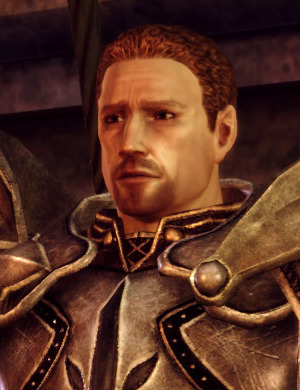

to this

In DAI, Cullen is probably the returning character with the biggest upgrade in raw looks, with a brand new aesthetic featuring that beautiful ornate armor and furs. But setting comparison to previous versions aside, this avatar is perfect for persuading players—especially newcomers to Dragon Age—to his line of thinking.
It doesn’t hurt that the Templar Quest has some major advantages over the Mage one, including better characters and a better story involving an envy demon who has led the mostly well-meaning bunch astray.
Meanwhile the Mage quest has a time-travel subplot which only serves to underline the dangers of magic.
Cullen is openly furious if you side with the mages—or worse, invite them as free allies rather than subjugate them. Again, I remember his trauma from Origins. But maybe that just means he wasn’t the best one for the job of Inquisition Commander? Couldn’t we have chosen someone else to lead and Cullen as the companion?
Leliana on the other hand, isn’t nearly as vocal in her defense of the Mages.
It gets worse when we come to the (esp mage) companions.
Solas cares little for the fates of Mages or Elves. He cares more for the denizens of Fade, and for lore of days long gone. In fact, Solas reminds of an Ascian from FFXIV. Hmmm. Maybe I’ll talk about that some other time? Anyway. In one of his personal quests involves confronting Kirkwaller Mages who have summoned one of his Spirit friends and turned her into a demon of Pride. One of them even adds insult to injury by claiming to be Kirkwall’s leading export on them.
Vivienne is openly ambitious, and is pro-Circle because she was already at the highest echelons (after a lot of hard work in both study and politics, so I do understand where she’s coming from), a place she’s worked to gain. For her, restoring the Circles is in pursuit of regaining her own lost prestige with interest.
Dorian is the only mage in favor but he arrives very late to the discussion, and even he doesn’t dispel the cloud around unchecked magic. He is after all, one of the leading researchers who made time travel work. And he is always talking about how bad the Magisters (unchecked mages) are.
Among the other companions, most aren’t as invested in the issue, but Casandra—by inviting Cullen (aka Second in command during Meredith’s reign of terror and red lyrium) to take the top post in the Inquisition’s army—has already made her position clear. IIRC she is okay with not imprisoning the mages though.
The lessons of previous games are forgotten. The oppression of the Mages in Kirkwall. The complete uselessness of the Templars during Uldred’s rebellion (Vivienne remarks that at the time First Enchanter Irving would have been happy to have more Templars, but conveniently omits the fact that the situation the Templar army couldn’t handle was brought under control by a small party composed entirely of non-Templars. Another interesting thing to note is how Wynne—a Senior Enchanter—is tricked by the Sloth demon’s tricks whereas Morrigan—the ‘unlearned’ apostate—and Sten are not fooled. This raises questions of just how well the curriculum in the Circles prepare a student for such an encounter. Templars are also just as easily hoodwinked by desire demons as mages are, which adds to the feeling that maybe they’re not that good after all.
But I think there’s a reason for all of this. The Inquisition is meant to be an ultimately Andrastian force. The Inquisitor does not come in with firsthand knowledge of previous games’ events. They have only heard tales distorted by a dozen reteller (again, Vivienne’s version of Kinloch hold). They have mostly grown up with the Chantry’s philosophy dictating their thinking pattern. The Dalish are already quite aware of the dangers of debased mages who form a ruling class, namely Tevinter, so they too would understand the fear and distrust, though they have been known to relax it in favour of trustworthy individuals and Keepers. And no matter the Herald’s backstory and leanings, much of the Inquisition’s core is formed around the faithful. Even if the Sunburst Throne is taken by the progressive Leliana, I think the Inquisitor is meant to be biased against total Mage freedom.
As with DAO and DA2, we have only limited control over the ultimate fate of the world. That is why each game features a different protagonist, and no matter how well they do, they get swallowed whole by the inrushing tide of history in motion. (from a meta perspective, this makes it easy for newer games. Fewer world states and all that. This would be harder if a player was allowed a wider range of outcomes)
41 notes
·
View notes
Text
I’m a bit upset. I have both PTSD and CPTSD (which follow me every fucking day, tyvm, so I know the lasting effects), I have spent 2000+ hours playing DAI, I’ve exhausted all Cullen’s dialogue options in DAI, exhausted all his dialogue in other games, and read his profile in WOTv2, so it’s not like I don’t have the knowledge and understanding of Cullen’s character to form my opinion. I will always, always believe they didn’t do enough for Cullen’s character, that Cullen’s redemption arc was/is almost non-existent, and that no matter how well written his PTSD is, it doesn’t excuse him from his past actions or his “Yes, but...” attitude in DAI. I’m talking and referring to writing mechanics here, which reflect real life, and is used to show progression and forward motion, aka overcoming blocks and deadends.
You literally can fill in any Cullen you want by Trespasser. His haters can say he hasn’t changed or isn’t remorseful and they can be right despite Cullen saying differently in a few scenes. Because he only said it passively, we didn’t get to see it. His breakdown is about his recovery and his PTSD, NOT his redemption. Yes, they go together (his PTSD will affect his recovery and his redemption), and that’s why I am upset at his writing because they wrote one side but, to me, forgot the other. It wasn’t enough for me. The writing doesn’t challenge that part of Cullen’s story.
In fact, his excuse by mid-game “Meredith’s methods were harsh but the kept people safe” only shows that he hasn’t truly reflected on all the damage he has dealt (”but his PTSD” you may say. That, to me, someone with PTSD/CPTSD, is an excuse. He should have done SOME reflecting by this point, especially since he acknowledges some of his failings/what happened. If you say he can’t because of his mental illness then there is no story, there is no forward motion, you write stories for the forward motion, not to be static). Yes, he says the Inquisition is his chance to atone, that people died is “a truth that haunts” him, but he says this between saying mages shouldn't be free (nor imprisoned) and Meredith’s methods kept people safe. At this point you can say due to his PTSD he is still recovering and won’t be at the point to say otherwise. Well, at what point will, a fictional character, who has been recovering for the last two years or so, start to say, “perhaps not all Templars weren’t innocent and that may have been part of the problem” (his respect for the Templars is one thing, but blind faith is another. I know he will always respect Templars and look up to them, but perhaps he can see that mages weren’t the only dangers in the Circles) or “perhaps we can give mages a chance to show themselves capable of being free” (if mages were allied and they’ve been free for some time)? Recovery is an individual thing, some people need more time than others. But I believe enough time has passed for Cullen to begin to show enough change that I shouldn’t even need to have this opinion.
We have Blackwall literally turn himself in, an action you cannot refute. That is an action that leads to a true redemption. You can not say Blackwall hasn’t changed at that point. Now we have Cullen’s breakdown (which may, for some, be enough) but those two are actually completely different to me. Cullen’s breakdown is about his recovery from Lyrium and his trauma, wanting to get away from a life that wasn’t what he wanted for himself. His breakdown was not part of his redemption (yes, he worries about not doing enough for the Inquisition, but that one line seems more about his own abilities off lyrium than anything else). In fact it’s was only after this breakdown could his redemption arc truly begin. But I feel that afterwards we get nothing. We get a climax (his breakdown) but then no following resolution. He says, if you keep him off lyrium, that maybe he can put those events behind him now. So why not push him a little? Have him meet someone he wronged? Give him a smaller breakdown after Blackwall turns himself in, question himself just a little instead of asking “why” Blackwall would do such a thing? Give us bigger insight on Cullen’s own self reflection.
Two steps forward, one step back.
At the very least have him by the end of Inquisition state more about Meredith? Truly have him renounce her, to take back what he said mid-game and realize her methods were what drove the mages to fear? Fear that he saw in their eyes and recognized (hello WOTv2)? How much healing would that give Cullen to do that? Meredith straight up made his mental health worse, abused him and his vulnerability, and him finally stating that he can see just how much damage she did to him? How is that not a good step forward? (it’s adds to his beginning redemption, it’s a start not an end.) It may be words, but the writing could have backed them up by adding a line to his end game slide stating that his Templar clinic invited mages as healers perhaps? That his good works included helping mages?
I, personally, needed more. I needed more falling action, more resolution, more on Cullen’s changing opinions and thoughts near the end of the game (not just on mages either). Something, anything, that is clear for everyone. It may be clear for you, but it wasn’t for me and, I know, for others. And not because we don’t understand Cullen or PTSD. For you, the writing may have been enough, and that’s fine, I’m happy for you because you’re not frustrated like I am about it. It’s done, DAI is over, and Cullen’s story is told. To me, as someone who also knows Cullen and PTSD, Cullen’s story frustrates me because it wasn’t enough to satisfy me, it didn’t feel complete to me.
I love Cullen, I know he wants to be a good person. But the dude has flaws. And he is not just his PTSD. He has done bad things (mostly, inaction) and those bad things were not properly addressed during DAI in my opinion. PTSD is a reason why, and a speed-bump to recovery, but not an excuse and not a reason to simply ignore a part of Cullen’s story. Him getting over his PTSD or him beginning to heal during DAI is not a redemption arc. It is part of a bigger story, Cullen’s story, which comprises of his lyrium recovery, his healing/his PTSD, and his redemption. Focusing on one does not take the place of the other. Focusing on one and ignoring the other is forgetting the other. I don’t want that! I want Cullen to have an amazing arc that I know he can have! I want this because I love the character. And I hate missed potential.
Recognizing a character’s flaws is not a bad thing! How can you truly love a character without knowing all sides of them? Cullen is thick headed and an ass sometimes, but that’s okay, those are his flaws, love him or hate him. He can also be gentle and cares about others. I’m the Dorian of Cullen fans tbh, I may talk shit about Cullen, but it’s because I care and love him that I do. If I hated him or didn’t like him, I wouldn’t have taken my whole freaking morning writing this damn post. ...which I may delete, IDK. Like, the only hate you see on my blog is for Moffat, like, if I don’t like something, I just ignore it. But I care too much because: Potential, layers, dynamic, hey they did the mental illness thing good, hey his romance is good, hey this is good start, let’s do this...wait, where’s the rest of it? :(
(Here is some views I want Cullen to have by the end of Trespasser, which seem reasonable to me, that I would have loved to see some clue in the game to him having:
He still views mages as very dangerous, but no longer thinks less of them for it (as he did in DA2 and some of DAI). He’ll come to respect most mages for their continued fight against demon temptation like he would an old warrior. (Occasionally his fear of mages will return as a knee jerk reaction but he will correct himself.)
He still supports Templars but does not want to see them within the Chantry. He will also accept the idea of mages within the Templar ranks, believing cooperation will be more efficient than not. He will also push for more Templar presence in all places, but mostly near the College of Enchanters. He will also help those who wish to shed their Lyrium addiction and call for ways the order can continue without such a crutch. In general, he’ll want the Order to reform for the better.
He accepts that mages can govern themselves but continues to believe in strong magical law enforcement, such as Templar presence in towns and cities, laws that restrict magical use, strong punishments for those who use magic to harm others, etc. He continues to follow Andraste’s words that magic is meant to serve.
He believes in strong magical education that should continue into adulthood or more.
He will always believe in no tolerance for blood magic, that those who practice it should be put to death. He will, however, be reasonable (after being talked to), that blood magic done with only the use of one’s own blood should not mean insta-death, but instead a (long) prison sentence.)
Also also, I never fucking said Cullen was a bad person, omg...
#///#blah blah#blah#fuck tags#ranting#because I feel ignored#by some#or patronized#w/e#fandom bullshit#may delete later
17 notes
·
View notes
Note
hey!! all this dragon age art is really cool!! do you have any recs for where to start in the series (i did get origins on sale a lil while back, couldn't really get into it)
Heads up right away, this is going to be a long ass post, sorry!
If you have any questions feel free to ask me btw or if you need something clarified, I know this is long and kind of all over the place!
First off, I had the same problem getting into Dragon Age. I tried playing Origins because I was interested in the gameplay of friending and romancing your companions, LGBTQ+ characters, being able to make choices that effect the world, and the fantasy setting. However, I got too bored and decided to skip ahead and play DA2.
DA2 is obviously lacking in terms of content, story, no different races for main character, and settings (reused dungeons galore!) but I also think it is very solid in delivering the information and lore of the world in interesting ways and the characters are all interesting and compelling. Plus, it is easy to finish the main game in 24 hours so it’s a nice, quick introduction. The combat is much sleeker and easier to use and the skill/spell trees make picking the different combat options for your character a lot easier and understandable. Now, there are certain parts of DA2 that correspond to you having knowledge of the events and lore tidbits of DAO, but that didn’t bother me as much when I first played it, and you can always search up any context!
However, while I think that DA2 can be a great introduction to people seeking to play the Dragon Age series, I would recommend not completely skipping Origins unless it just doesn’t interest you enough. The combat can be wonky and put people off–it did for me– but after a few playthroughs you do get used to the turn-style combat. Going into Origins with some aspects of the lore and questions I had from DA2 can help engage you in the story a lot more and be like “oh, so that’s why so and so thinks this!” or “Oh, that’s why this happened!”
I also understand that there are parts that can seem uninteresting and too long and I’ll go into that:
The Fade and the Deep Roads are honestly super long and very drawn out with not much going on and can be frustrating! Thankfully some awesome people have created mods where you can skip these sections:
Skip the Fade: https://www.nexusmods.com/dragonage/mods/816
Shortcut thru the Deep Roads: https://www.nexusmods.com/dragonage/mods/4560/
While I totally recommend Skip the Fade, I would recommend doing the entire Deep Roads for your first playthrough, because there are some interesting and truly horrifying parts in the quest. However, after your first playthrough, definitely get the mod.
You could start Inquisition as your first game, and I know some people have, and it is definitely a viable option with the improved combat, graphics, etc. However, going into Inquisition with knowledge of the last two games can really help you understand the small things in the game and lore aspects that come up. You can totally just not, but I think knowing a lot about the world makes some of the lore reveals and other themes in the game have a bigger impact (aka why the hype for DA4 is so strong rn with you know who).
If you decide that, finally, Origins is not for you, but you want to have decisions from that game impact DA2, DAI, and soon DA4, Bioware has a website called The Dragon Age Keep where you can select and input your choices for certain major decisions in the games. Some of these decisions do need context, but I’m sure there are posts or videos that explain some of these!
In terms of DLC, the more important ones for each game would be:
Origins: The Stone Prisoner, Dragon Age: Awakening, and Witch Hunt
DA2: Legacy
DAI: Jaws of Hakkon, The Descent, and especially Trespasser (although a DLC it is pretty much the true ending of Inquisition)—-> GOTY edition has all of these!
And, if you happen to find you are more interested in the lore than the gameplay, I highly recommend Ghil Dirthalen on YouTube! She makes great lore videos and has multiple videos that go into depth about certain themes or groups or ideas in the Dragon Age universe that can help you better understand certain parts or help develop your opinions! Also, on the channel Codex Added, she and another youtuber The Exalted March are doing a funny and crazily modded Inquisition playthrough.
What is also great is that Ghil Dirthalen is doing a playthrough on Codex Added of her canon playthroughs for the three Dragon Age games and has currently been livestreaming her canon decisions for Origins! I totally recommend watching this if you can’t get into Origins and might want to watch someone play the game who knows what they are doing and there are some great people that join the streams!
And, finally, there are other types of Dragon Age content outside of the games. There are currently five books out that depict scenes outside of the main games: Dragon Age: The Stolen Throne, Dragon Age: The Calling, Dragon Age: Asunder, Dragon Age: Last Flight, and Dragon Age: The Masked Empire.
I have only read The Masked Empire and know for certain that it and Asunder take place right before Inquisition but otherwise I don’t know the chronology for the other books.
There are also comics as well if those might interest you more than the books!
Hopefully this was helpful in some ways, I totally get how Origins can make it hard to get into the series!
#i have a lot of emotions about this series#hopefully this made some sense for you and others!!!!#sarah's shenanigans#dragon age#cecilmcsmith
2 notes
·
View notes